| Laureates of the Doerenkamp-Zbinden Foundation |
| 2011: Doerenkamp-Zbinden Prize 2011 for Sonja Jeram |
 Sonja Jeram, National Institute of Public Health, Slovenia, was Sonja Jeram, National Institute of Public Health, Slovenia, was
awarded the Doerenkamp-Zbinden Prize 2011 on August 25 at the 8th World Conference on Animal Use and Alternatives in Montreal, in acknowledgment of her outstanding work in the promotion of alternatives to animal testing in ecotoxicology, especially in recognition of her contribution to acute fish toxicity. With last year's acceptance by the OECD of the respective guidance document describing the Threshold Approach for Acute Fish Toxicity Testing (GD126), a major reduction in fish use is expected.
Sonja Jeram attained her PhD in Biology at the University of Ljubljana, Slovenia, in 1990. After working at the National Institute of Biology for 8 years she established a laboratory at the National Institute of Public Health to control pollution of industrial waste water in 1997. This led to interests in hazard and risk assessment of chemical substances and the establishment of the Slovenian Society of Toxicology in 2000, where she became secretary general. She developed a new testing strategy to reduce the use of fish in acute ecotoxicity
testing of new chemical substances notified in the European Union in collaboration with the European Centre for Validation of Alternative Methods (ECVAM). She is currently working on identification and evaluation of variability of in vivo toxicity test results, which is crucial in validation process for alterantive methods. |
| |
| 2010: Doerenkamp-Zbinden Prize 2010 for Michael Balls |
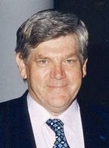 For his life’s work, Michael Balls, zoologist and emeritus Professor for Medical Cell Biology, editor of the journal ATLA since 1983 and former director of ECVAM was chosen to receive the Doerenkamp-Zbinden Prize 2010 unanimously by the Doerenkamp-Zbinden foundation board. For his life’s work, Michael Balls, zoologist and emeritus Professor for Medical Cell Biology, editor of the journal ATLA since 1983 and former director of ECVAM was chosen to receive the Doerenkamp-Zbinden Prize 2010 unanimously by the Doerenkamp-Zbinden foundation board.
Like no other Michael Balls has shaped the field of alternative methods. He studied zoology at Oxford, worked later at the University of Geneva and the University of California, Berkeley, Reed College, Portland, OR, and the University of East Anglia. In 1985 he moved to the University of Nottingham Medical School where he was professor of medical cell biology from 1990-1995. Balls became a trustee of FRAME (Fund for the Replacement of Animals in Medical experiments) in 1979 and has been chairman of the trustees since 1981. 1993-2002 he was the first director of ECVAM (European Centre for the Validation of Alternative Methods). Balls drove the development of the principles of validation of alternative methods and contributed to their first successful outcomes. He is well known for his quick intellect and provocative manner, having stimulated many discussions and given many impulses to advances in the replacement of animal experiments. Michael Balls was invited by the DZF to the social evening of the Linz Congress, where he received the prize from President Franz P. Gruber and Vice President Thomas Hartung. |
| |
| 2010: DZF Medal of Honour for Walter Pfaller |
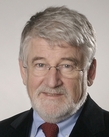 During the social evening of the Linz Congress held in September 2010 a Doerenkamp-Zbinden Foundation’s honorary medal for achievements in the field of alternative methods was awarded to emeritus Professor Walter Pfaller of the University of Innsbruck. During the social evening of the Linz Congress held in September 2010 a Doerenkamp-Zbinden Foundation’s honorary medal for achievements in the field of alternative methods was awarded to emeritus Professor Walter Pfaller of the University of Innsbruck.
He studied and worked at the University of Innsbruck continually with only one interruption in 1976-1977, during which he was at the University of Maryland, Baltimore, and later became Professor of Physiology. With his involvement in a series of EU projects, his contributions to EUSAAT (European Society for Alternatives to Animal Testing) and set (Stiftung zur Förderung der Erforschung von Ersatz- und Ergänzungsmethoden zur Einschränkung von Tierversuchen, the organisation of the Linz Congresses, the ECVAM Scientific Advisory Committee (European Centre for the Validation of Alternative Methods) and the board of CAAT-EU (Centre for Alternatives to Animal Testing – EU), he has contributed much to the advances of alternative methods in the last two decades. |
| |
DZ Prizes - WC7 ROME 2009, DZ Poster Awards
The following posters were choosen from the DZF poster award commission:
ID ABS: 42
Routine and experimental application of the monocyte activation test (MAT) in the Paul-Ehrlich-Institut (PEI)
I. Spreitzer, B. Loeschner, C. Bache, K. M. Hanschmann, C. K. Schneider and T. Montag
Paul-Ehrlich-Institut, Langen, Germany
ID ABS: 60
Characterization of pathomechanisms relevant to Alzheimer’s disease in a human neuronal model system
D. Scholz and M. Leist
University of Konstanz – Doerenkamp-Zbinden Chair of Alternative In-Vitro Methods, Konstanz, Germany
ID ABS: 82
Human neurospheres can identify neurotoxicants in vitro
T. Rockel, J. Abel and E. Fritsche
Institut für umweltmedizinische Forschung (IUF) an der Heinrich-Heine-Universität GmbH, Duesseldorf, Germany
ID ABS: 122
Software controlled artificial animal models for teaching animal experiments
C. Patil1 and R. Raveendran2
1R. C. Patel Institute of Pharmaceutical Education and Research – Department of Pharmacology, Shirpur, India; 2Jawaharlal Institute of Postgraduate Medical Education and Research – Department of Pharmacology, Pondicherry, India
ID ABS: 150
The influence of environmental enrichment on clinical
pathology and cardiovascular parameters in rats
L. Mikkelsen1, D. Sørensen2, T. Krohn2, B. Lauritzen1, N. Dragsted1, A. Hansen2 and J. Ottesen1
1Novo Nordisk A/S, Novo Nordisk Park, Maaloev, Denmark, 2University of Copenhagen, Department of Veterinary Disease
Biology, Faculty of Life Sciences, Frederiksberg, Denmark
ID ABS: 217
Zebrafish (Danio rerio) as a versatile in vivo screening platform
W. Kamphuis, E. Groen, S. Thun-Battersby and E. Ronken
Solvay Pharmaceuticals Research Laboratory, Weesp, The Netherlands
ID ABS: 255
An inter-laboratory study of short time exposure (STE) test for predicting eye irritation potential of cosmetic ingredients and formulations
T. Hayashi1, Y. Takahashi2, S. Watanabe3, M. Koike2, N. Aisawa3, S. Ebata3, H. Sakaguchi2, T. Nakamura3, H. Kuwahara1 and N. Nishiyama2
1Kanebo Cosmetics Inc., Kanagawa, Japan; 2Kao Corporation, Tochigi, Japan; 3Lion Corporation, Kanagawa, Japan
ID ABS: 364
ORCHESTRA: a new EC project to link the research of in silico models with users’ needs
E. Benfenati1, G. Gini2 and I. Malerba3
1Istituto di Ricerche Farmacologiche Mario Negri, Milano, Italy; 2DEI, Politecnico di Milano, Italy; 3Centro REACH, Milano, Italy
ID ABS: 379
Transportation as major life event in rats, effect on welfare and limits of adaptation
J. Arts, K. Kramer and F. Ohl
Utrecht University, The Netherlands
ID ABS: 396
Development of an ex vivo human gut mucosal challenge model to replace animal testing
J. Drew1, A. Farquharson1, E. Moss2, K. Macdonald2, S. Lynagh2and D. Bunton2
1Rowett Institute of Nutrition and Health, University of Aberdeen, UK; 2Biopta Ltd, Glasgow, UK
ID ABS: 441
The use of a long shelf-life in vitro cell model of the human airway epithelium (MucilAir™) for inhalation toxicity assessment
S. Constant, S. Huang, M. Caulfuty and L. Wiszniewski
Epithelix Sàrl, Geneva, Switzerland
ID ABS: 584
International acceptance of in vitro alternative ocular safety test methods: bovine corneal opacity and permeability (BCOP) assay (draft OECD TG 437)
J. Merrill1, M. Wind2, W. Stokes3, J. Barroso4, V. Zuang1, P. Amcoff5, H. Kojima6, A. Jacobs1, D. McCall7, D. Allen8 and R. Tice9
1US FDA, Silver Spring, MD, USA; 2US CPSC, Bethesda, MD, USA; 3NICEATM/NTP/NIEHS/NIH/DHHS, Research Triangle Park, NC, USA; 4ECVAM, JRC, EU, Ispra, Italy; 5OECD, Environment Directorate, Paris, France; 6JaCVAM, Tokyo, Japan; 7US EPA, Washington, DC, USA; 8ILS, Inc./NICEATM, Research Triangle Park, NC, USA; 9NTP/NIEHS/NIH/DHHS, Research Triangle Park, NC, USA |
| |
| 2007: DZF Medal of Honour for Günter Verheugen |
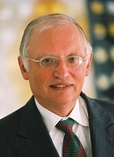 Vice-President of the European Commission Günter Verheugen has engaged himself very intensely in reducing the number of animal experiments performed in Europe by promoting alternative concepts. Vice-President of the European Commission Günter Verheugen has engaged himself very intensely in reducing the number of animal experiments performed in Europe by promoting alternative concepts.
As host of the conferences in Brussels under the motto "Europe Goes Alternative" Günter Verheugen very significantly contributed to the establishment of a partnership with industry. This agreement demonstrates that the European Union is prepared to play a leading role in animal protection.
An important step was also taken towards the goal of making existing and validated alternative methods available. With this vice president Günter Verheugen took an important step forward with regard to the implementation of the 3R-principles of Russel and Burch in the European Union.
For this the Doerenkamp-Zbinden Foundation Board bestowed the Doerenkamp-Zbinden Medal of Honour 2007 on Günter Verheugen. The ceremony took place on November 26th in Brussels. |
| |
| 2007: The 2007 prize over 25.000 EURO was divided between the Austrian organisation "zet" and the German Animal Welfare Academy, Neubiberg |
| |
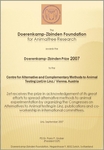 The Centre for Alternative and Complementary Methods to Animal Testing (zet) in Linz / Vienna, Austria, receives the prize in acknowledgement of its great efforts to spread alternative methods by organising the Congresses on Alternatives to Animal Testing in Linz, publications and coworkership in international committees. The Centre for Alternative and Complementary Methods to Animal Testing (zet) in Linz / Vienna, Austria, receives the prize in acknowledgement of its great efforts to spread alternative methods by organising the Congresses on Alternatives to Animal Testing in Linz, publications and coworkership in international committees.
Especially the fact that zet now runs own laboratories to develop alternative methods was the crucial argument to award zet with the 2007 Dorenkamp-Zbinden Prize 2007 |
| |
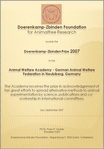 The Animal Welfare Academy of the german Animal Welfare Federation in Neubiberg/Munich receives the prize in acknowledgement of its great efforts to spread alternative methods to animal experimentation by science, publications and coworkership in international committees. The Animal Welfare Academy of the german Animal Welfare Federation in Neubiberg/Munich receives the prize in acknowledgement of its great efforts to spread alternative methods to animal experimentation by science, publications and coworkership in international committees.
Especially the fact that the Academy runs own laboratories to develop alternative methods was the crucial argument to award the Animal Welfare Academy with the Doerenkamp-Zbinden Prize 2007. |
| |
2006: David Dewhurst
|
 The Foundation Board of the Doerenkamp-Zbinden Foundation has unanimously decided to bestow the Doerenkamp-Zbinden Prize 2006 on Professor Dr. David Dewhurst from the University of Edinburgh. The Foundation Board of the Doerenkamp-Zbinden Foundation has unanimously decided to bestow the Doerenkamp-Zbinden Prize 2006 on Professor Dr. David Dewhurst from the University of Edinburgh.
David Dewhurst receives the Prize for his outstanding contributions to the replacement of animals in teaching of physiology and pharmacology.
As Director of Learning Technology he provides academic and strategic leadership of the Learning Technology Section at the College of Medicine and Veterinary Medicine.
Before coming to Edinburgh in 1999, he was Professor of Health Sciences at Leeds Metropolitan University, where he managed a courseware development project over 12 years (all programmes are distributed by Sheffield BioScience Programs). He is Deputy Director of the IUPHAR (International Union of Pharmacologists) Teaching Committee and member of the British Pharmacological Society (BPS) Education sub-committee.
Dewhurst’s work in the field of alternatives to the use of animals in teaching started in 1986 and has centred around the development and evaluation of interactive, multimedial computer-assisted learning (CAL) programmes designed to replace animal use in pharmacology and physiology. His team has developed over 40 CAL programmes and more than half of these are designed to be direct replacements for traditional practical classes that use animals. The alternatives computer programmes have been developed for a number of technology platforms and operating systems and are used in over sixty countries. Each programme will occupy students for several hours and is designed to be used in either a tutor-supported learning environment or for independent study.
The various research and development projects have been funded for much of this period by grants from the Lord Dowding Fund and with smaller grants from the UK Home Office, the DZF and ECVAM.
David Dewhurst was awarded the FISEA Award for his work in 1998, and he was the winner of the 1996 Multimedia Festival held at the 2nd World Congress on Alternatives in Utrecht.
Evaluation of the educational effectiveness of these teaching resources has been an important component of his work and has been instrumental in persuading often sceptical teachers and colleagues around the world that important learning outcomes can be achieved by their students without the use of animals. This work has been published in over 170 publications.
Together with Dr. Jan van der Valk (University of Utrecht) he established and co-directs the European Centre for Alternatives EURCA (www.eurca.org), which aims to promote the use of alternatives to animals in higher education and to establish a network of university teachers experienced in the use of alternatives across all EU countries.
Please visit the list of laureates at the German part of this website |
|



